英语过去完成时和过去完成进行时的区别
一般过去时、过去进行时、过去完成时(课堂PPT)

3
常用时间 常与一般过去时态连用的时间有:
yesterday yesterday morning (afternoon, evening…) last night (week, month, year…) two days ago, a week ago, three years ago… in 1990, (in 1998…)
C. has just stared D. had just stared 18
5.I first met Lisa three years ago. She ___ at a radio shop at the time.
A. has worked
B. was working
C. had been working D. had worked
指当时一时的表现12一般过去时与过去进行时的区别1一般过时往往表示某一动作已经完成而过去进行时却表示动作在持续或未完成
一般过去时
1
一般过去时
知识结构
构成 用法 常用时间
动词的过去式
1、表示过去某个时 间发生的动作或 存在的状态。
2、表示过去经常或 反复发生的动作。
yesterday
last night
in 1990
two days ago
2
用法 1、表示过去某个时间发生的动作或存在的状态。
He was here yesterday. I got up at six thirty yesterday morning. My father was at work yesterday afternoon. Did you have a good time last summer?
一般过去时,过去进行时和过去完成时

一般过去时1.表过去发生的事情或存在的状态eg Suddenly,the clouds cleared and the rain stopped.2.表过去经常发生的事情eg I was very thin in my childhood.3.带有确定的过去的时间状语eg Did you meet yesterday? He left just now.We often played together when we were children. 我们小时候常在一起玩。
He used to smoke a lot, but he doesn’t now. 他过去经常抽烟,但现在不抽了。
Whenever we were in trouble, he would help us. 每当我们遇到困难,他都会帮助我们。
He said he would wait until they came back.常和一般过去时连用的过去时间状语有:last night (week ,month , year , century , etc.) , yesterday , the day before yesterday , yesterday morning ( afternoon , evening ) , in 1999 , two hours ago ( one week ago , tree years ago , …)等等。
使用一般过去时,在某种意义上说就是要强调动作或状态发生或存在于过去的某个时候。
"过去"的时间概念有两层意思:一是指"现在某个时间"以前的时间;二是指"说话、写文章的那个时间点"以前的时间,注意:用于某些特殊结构中表示现在:It’s time we star ted. 我们该动身了。
I wish I knew his name. 要是我知道他的名字就好了。
英语中过去完成时和过去完成进行时区别用法

过去完成时和过去完成进行时过去完成进行时(Past Perfect Progressive Tense)过去完成式是不能单独用的。
我们用的时候,必须有另一个事件。
也就是说,假如我们有两件事A 和B,两件事都发生在过去,但A 发生在B 以前,A 应该用过去完成式,B 则用过去式。
以下是几个例子:(1)他到台湾以前,曾学过中文。
He had studied Chinese before he came to Taiwan.(2)他念大学以前,曾前工作过。
He had worked before he decided to go to college.(3)我写这篇有关爱尔兰的小说以前,曾去过爱尔兰。
I had been to Ireland before I wrote this book about Ireland's people.(4)我在上大学以前,已经学过微积分。
I had studied calculus before I got into college.(5)周一以前,已经下过雪了。
It had already snowed before Monday.(6)警察到来之前,小偷已经跑了。
When the police arrived, the thieves had already run away.(7)到那时,他的家人已经有半年没有他的消息了。
Until then, his family hadn’t heard from him for 6 months.如果我们要强调较早发生事件的连续性,我们可以用过去完成进行式。
占去完成进行式和现在进行式惟一不同的地方是verb to have 的地方一定要用had 。
以下是一些过去完成进行式的例子:1. I had been watching TV before you called me.2. I had been working hard in a company for many years before I went to college.3. He had been studying before he went to class.4. He had been driving all day before he went to sleep.过去完成时1)概念:表示过去的过去----|-------|-----|---->其构成是had +过去分词构成。
一般过去时过去完成时和过去进行时的区别
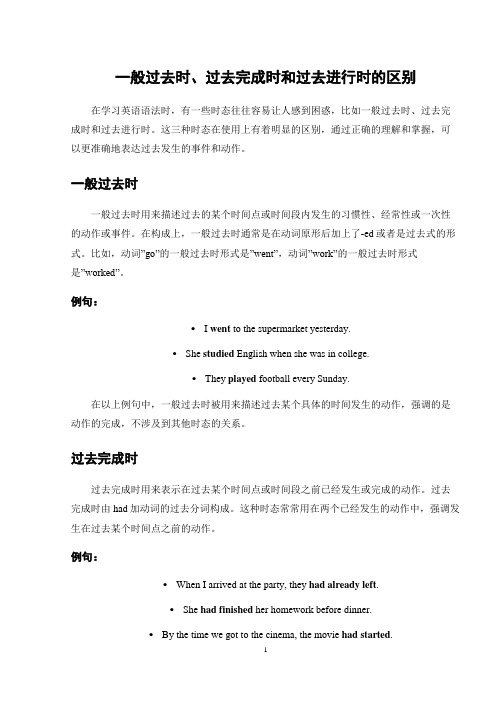
一般过去时、过去完成时和过去进行时的区别在学习英语语法时,有一些时态往往容易让人感到困惑,比如一般过去时、过去完成时和过去进行时。
这三种时态在使用上有着明显的区别,通过正确的理解和掌握,可以更准确地表达过去发生的事件和动作。
一般过去时一般过去时用来描述过去的某个时间点或时间段内发生的习惯性、经常性或一次性的动作或事件。
在构成上,一般过去时通常是在动词原形后加上了-ed或者是过去式的形式。
比如,动词”go”的一般过去时形式是”went”,动词”work”的一般过去时形式是”worked”。
例句:•I went to the supermarket yesterday.•She studied English when she was in college.•They played football every Sunday.在以上例句中,一般过去时被用来描述过去某个具体的时间发生的动作,强调的是动作的完成,不涉及到其他时态的关系。
过去完成时过去完成时用来表示在过去某个时间点或时间段之前已经发生或完成的动作。
过去完成时由had加动词的过去分词构成。
这种时态常常用在两个已经发生的动作中,强调发生在过去某个时间点之前的动作。
例句:•When I arrived at the party, they had already left.•She had finished her homework before dinner.•By the time we got to the cinema, the movie had started.在以上例句中,过去完成时指明了在过去某个时间点之前已经完成的动作,通过这种时态可以清晰地表达出事件之间的先后顺序。
过去进行时过去进行时用来描述在过去某个具体时间或时间段内正在进行的动作。
过去进行时由was/were加动词的ing形式构成。
这种时态强调了动作或事件发生时正在进行的状态。
12种时态的名称

12种时态的名称
英语共有12 种时态,分别为:一般现在时、一般过去时、一般将来时、过去将来时、现在进行时、过去进行时、将来进行时、现在完成时、过去完成时、将来完成时、现在完成进行时和过去完成进行时。
以下是它们的名称和用法:
1. 一般现在时:表示现在经常发生的动作或存在的状态。
2. 一般过去时:表示过去某个时间发生的动作或存在的状态。
3. 一般将来时:表示将来某个时间要发生的动作或存在的状态。
4. 过去将来时:表示过去某个时间将要发生的动作或存在的状态。
5. 现在进行时:表示现在正在进行的动作。
6. 过去进行时:表示过去某个时间正在进行的动作。
7. 将来进行时:表示将来某个时间正在进行的动作。
8. 现在完成时:表示过去发生的动作对现在造成的影响或结果。
9. 过去完成时:表示过去某个时间之前已经完成的动作。
10. 将来完成时:表示将来某个时间之前已经完成的动作。
11. 现在完成进行时:表示过去某一动作开始一直持续到现在,并且可能还要持续下去。
12. 过去完成进行时:表示过去某一动作开始一直持续到过去某一时刻,并且可能还要持续下去。
以上是12 种时态的名称和用法,需要注意的是,每种时态的用法都有
一些细节和特殊情况,需要根据具体语境来理解和使用。
过去完成时知识点归纳与总结
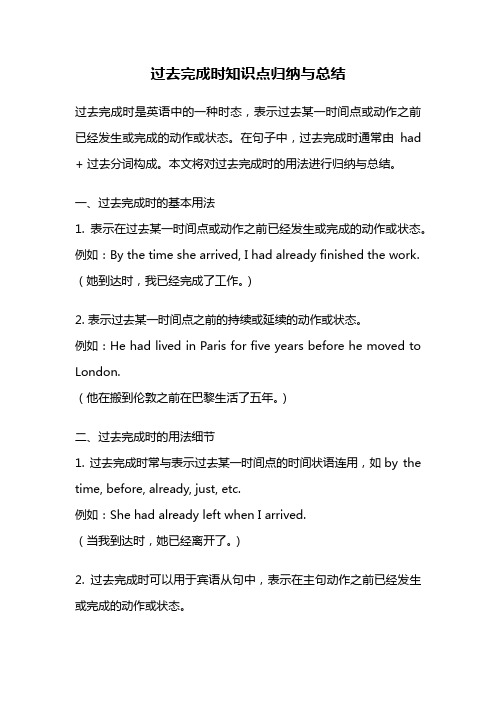
过去完成时知识点归纳与总结过去完成时是英语中的一种时态,表示过去某一时间点或动作之前已经发生或完成的动作或状态。
在句子中,过去完成时通常由had + 过去分词构成。
本文将对过去完成时的用法进行归纳与总结。
一、过去完成时的基本用法1. 表示在过去某一时间点或动作之前已经发生或完成的动作或状态。
例如:By the time she arrived, I had already finished the work.(她到达时,我已经完成了工作。
)2. 表示过去某一时间点之前的持续或延续的动作或状态。
例如:He had lived in Paris for five years before he moved to London.(他在搬到伦敦之前在巴黎生活了五年。
)二、过去完成时的用法细节1. 过去完成时常与表示过去某一时间点的时间状语连用,如by the time, before, already, just, etc.例如:She had already left when I arrived.(当我到达时,她已经离开了。
)2. 过去完成时可以用于宾语从句中,表示在主句动作之前已经发生或完成的动作或状态。
例如:I didn't know that she had already seen the movie.(我不知道她已经看过这部电影。
)3. 过去完成时可以用于条件句中,表示与过去某一时间点相反的假设情况。
例如:If I had known you were coming, I would have prepared dinner.(如果我知道你要来,我会准备晚餐的。
)4. 过去完成时可以用于间接引语中,表示在引述的过去时间点之前已经发生或完成的动作或状态。
例如:She told me that she had already finished her homework.(她告诉我她已经完成了作业。
一般过去时与过去进行时的区别和过去完成时与过去完成进行时的区别

一般过去时与过去进行时的区别和过去完成时与过去完成进行时的区别一般过去时和过去进行时的比较一般过去时和过去进行时虽然同是指过去发生的动作或存在的状态,但是,他们还是有很大的质的区别,那就是他们所指的时间有很大的不同。
一般过去时所指的过去时间却比较笼统,而过去进行时所指的过去时间则比较具体。
试比较下面两组句子:A组She joined the League three years ago.The story took place in 1985.Aunt read me a story last night.B组Mary was cooking at this time yesterday.She was doing some washing when I come in.I was sleeping when the thief broke into the house.A组中的three years ago、in 1985、last night 所指的过去时间均较为笼统,因此必须采用一般过去时。
而B组中的at this time yesterday、when I came in、when the thief broke into the house 所指的过去时间均较为具体,因此必须采用过去进行时。
一般过去时和过去进行时,除了他们所指的时间有差别之外,还可以通过他们动作的性质来加以区别。
一般过去时表示在过去某个时间发生的动作或存在的状态,也表示过去经常或反复发生的动作。
它强调的是动作的“发生”或状态的“存在”。
过去进行时表示在过去某一时刻或在过去某一段时间内正在进行的动作。
它强调的是动作的“正在进行”。
试比较下面两组句子:C组Did he watch TV last night?I got up at five yesterday.I studied in that class last year.D组Mum was doing some washing yesterday evening.We were cleaning the classroom this time yesterday.The teacher was talking to some parents when I saw her.C组中的“看电视”、“起床”、“学习”都是属于过去某一时候动作的“发生”或状态的“存在”,所以必须采用一般过去时。
英语中现在完成时和现在完成进行时怎么区分,过去完成时和过去完成进行时又该怎么区分?.doc

英语中现在完成时和现在完成进行时怎么区分,过去完成时和过去完成进行时又该怎
么区分?
这个问题解决不难。
你要记住以下几点即可。
1,凡是用进行时的,肯定是要突出动作正在发生中,否则就不要用进行时。
比如,I have lived here for 5 years和I have been living here for 5 years。
这两句都很常见,区别就在于,前一句只是说明到现在为止已经完成的状态,但不知道说话时,这个动作是否还在进行。
而后一个句子不仅说到目前完成的状态,还强调在说话时动作还在进行中。
2,现在完成时和过去完成时的区别。
在做时态题目时,要看两点,一是句子当中明确给出的时间,比如看到了in the past +时间,我们一般就用现在完成时。
例如,in the past ten years, English has been taught in a new way in this school。
其次要看句子中别的动词用哪种时态,然后对比两个动词的发生顺序。
比如,English had been taught for 6 minutes when I arrived。
此句,当我到达的时候,英语已经上了6分钟了。
teach和arrive的发生有个顺序。
过去完成时与过去完成进行时态的区别
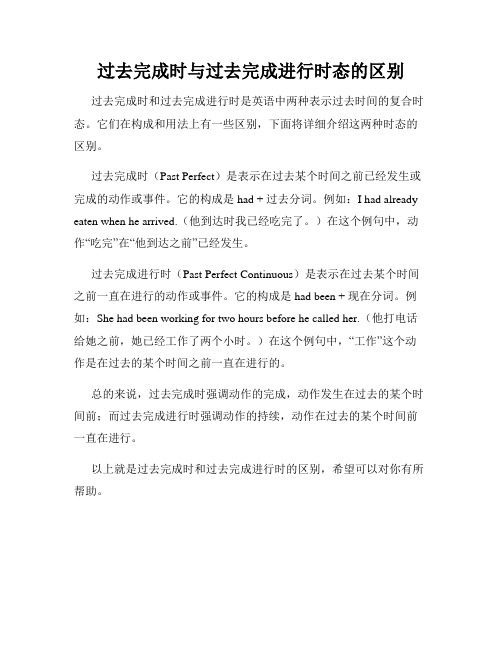
过去完成时与过去完成进行时态的区别
过去完成时和过去完成进行时是英语中两种表示过去时间的复合时态。
它们在构成和用法上有一些区别,下面将详细介绍这两种时态的区别。
过去完成时(Past Perfect)是表示在过去某个时间之前已经发生或完成的动作或事件。
它的构成是had + 过去分词。
例如:I had already eaten when he arrived.(他到达时我已经吃完了。
)在这个例句中,动作“吃完”在“他到达之前”已经发生。
过去完成进行时(Past Perfect Continuous)是表示在过去某个时间之前一直在进行的动作或事件。
它的构成是had been + 现在分词。
例如:She had been working for two hours before he called her.(他打电话给她之前,她已经工作了两个小时。
)在这个例句中,“工作”这个动作是在过去的某个时间之前一直在进行的。
总的来说,过去完成时强调动作的完成,动作发生在过去的某个时间前;而过去完成进行时强调动作的持续,动作在过去的某个时间前一直在进行。
以上就是过去完成时和过去完成进行时的区别,希望可以对你有所帮助。
过去完成时和过去完成进行时课件

05
过去完成进行时的基本概念
定义
过去完成进行时表示在过去某一时间 之前已经开始,并一直持续到该时间 为止的动作或状态。
该时态强调动作的持续性,强调动作 在过去的某个时间点之前已经开始, 并且这个动作在过去的某个时间点还 在进行。
用法
用于描述过去某一时刻之前已经 发生并持续的动作,强调动作的
持续性。
单击此处添加正文,文字是您思想的提一一二三四五 六七八九一二三四五六七八九一二三四五六七八九文 ,单击此处添加正文,文字是您思想的提炼,为了最 终呈现发布的良好效果单击此4*25}
过去完成进行时通常用于描述过去的某个时间点之前 已经开始,但这个动作在过去的某个时间点还在进行 的情境;而过去完成时则通常用于描述过去的某个时 间点之前已经完成的动作,不强调动作是否还在进行 中。
疑问句
Had+主语+过去分词+其 他成分
否定句型
主语+had not+过去 分词+其他成分
主语+hadn't been+ 过去分词+其他成分
主语+hadn't+过去 分词&主语+过去分词+其他成分 Hadn't+主语+过去分词+其他成分
Hadn't been+主语+过去分词+其他成分
过去完成时和过去完成 进行时课件
contents
目录
• 引言 • 过去完成时的基本概念 • 过去完成时的构成 • 过去完成时的句型 • 过去完成进行时的基本概念 • 过去完成进行时的构成 • 过去完成进行时的句型 • 练习与巩固
01
引言
过去完成时知识点归纳与总结

过去完成时知识点归纳与总结一、过去完成时的构成过去完成时是由助动词"had"和动词的过去分词形式构成的。
动词的过去分词形式通常是在动词原形后加上-ed。
例如:"had seen","had eaten"。
二、过去完成时的用法1. 表示在过去某个时间或动作之前已经发生或完成的动作。
例如:"She had already left when I called her."意思是"在我给她打电话的时候,她已经离开了。
"2. 表示过去某个时间点之前一直持续的动作或状态。
例如:"I had known him for years before he moved away."意思是"在他搬走之前,我认识他已经有很多年了。
"3. 表示对过去某个动作的猜测或假设。
例如:"He had probably gone to bed when I arrived."意思是"当我到达时,他可能已经上床睡觉了。
"4. 与"if only"连用,表示对过去某个动作的遗憾或后悔。
例如:"If only I had studied harder, I would have passed the exam."意思是"要是我当时学得更努力一些,我就能通过考试了。
"三、过去完成时的标志词过去完成时的常见标志词有:"already","just","before","when","after","by the time","until"等。
四、过去完成时与其他时态的区别1. 过去完成时与一般过去时的区别:过去完成时表示在过去某个时间或动作之前已经发生或完成的动作,强调先后顺序;而一般过去时则仅表示过去的动作或状态,没有先后顺序的含义。
中考英语——过去完成时、过去进行时、过去将来时、时态一致原则
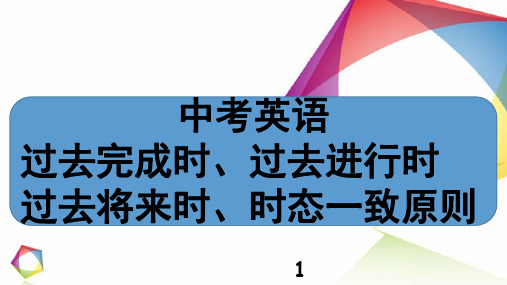
中考英语过去完成时、过去进行时过去将来时、时态一致原则1过去完成时规则动词的过去分词和它的过去式相同;不规则动词的过去分词需要特殊记住。
构成had doneHe had brushed teeth before he had breakfast.By the end of last month they had finished the work.23过去现在现在完成时过去完成时现在过去过去的过去过去完成时表示在过去之前已经完成的动作,即“过去的过去”。
4过去完成时表示一个动作或状态在过去某一动作之前已经完成或结束。
He before I . She me that she a new novel.had left arrivedtold had written现在过去过去的过去5现在过去过去的过去过去完成时表示某一动作或状态在过去某时之前已经开始,一直延续到这一过去时间,而且动作尚未结束,仍然有继续下去的可能。
By , my father here for two years. By , he eleven hours.the end of last year ten o'clock last night had lived had workedI have had dinner.×I had had dinner.I had had dinner before I went for a walk.I had had dinner before 8 o'clock last night.过去完成时是一个相对的时态,表示的是“过去的过去”,只有和过去某一时间或某一动作相比较,并且发生在其之前时才能使用。
6过去进行时构成was/were doingI watched TV last night.I was watching TV at 9 o'clock last night.I was watching TV when you knocked at the door.7表示过去某个时刻正在发生的动作。
过去完成进行时

• This is an irreconcilable conflict. 这是一个不可调和的矛盾。
• Armed conflict is likely to break out between the two countries. 这两国间有可能发生武装冲突。
• 不及物动词 vi. 1. 矛盾,冲突[(+with)] The hours of the two meetings conflict. 这两个会议时间冲突。
• Did she have a party recently? 她最近举办过聚会 吗?
• 注:两者通常都不用于将来。如: • 最近我们要去巴黎。 • 误:We will go to Paris lately [recently]. • 正:We will go to Paris soon. • 另外,lately 有时还可与一般现在时连用,指
• . 从使用的时态来看:两者都经常与完成时态 连用,也可与一般过去时连用(但此时用 recently 比用 lately 更经常)。如:
• He’s only lately [recently] begun working here. 他 只是近来才开始在这里工作。
• I haven’t been sleeping well recently [lately]. 我最 近一直未睡好。
• 2) If the book were in the library ,you should have it. (should 在句子里表说话人的意愿)
三、will
• 1.表示意志、意愿,有“愿、要”之意。例 如:
• 1) We will fight on until final victory is won.
一般过去时与过去进行时的区别和过去完成时与过去完成进行时的区别

一般过去时与过去进行时的区别和过去完成时与过去完成进行时的区别一般过去时和过去进行时的比较一般过去时和过去进行时虽然同是指过去发生的动作或存在的状态,但是,他们还是有很大的质的区别,那就是他们所指的时间有很大的不同。
一般过去时所指的过去时间却比较笼统,而过去进行时所指的过去时间则比较具体。
试比较下面两组句子:A组She joined the League three years ago.The story took place in 1985.Aunt read me a story last night.B组Mary was cooking at this time yesterday.She was doing some washing when I come in.I was sleeping when the thief broke into the house.A组中的three years ago、in 1985、last night 所指的过去时间均较为笼统,因此必须采用一般过去时。
而B组中的at this time yesterday、when I came in、when the thief broke into the house 所指的过去时间均较为具体,因此必须采用过去进行时。
一般过去时和过去进行时,除了他们所指的时间有差别之外,还可以通过他们动作的性质来加以区别。
一般过去时表示在过去某个时间发生的动作或存在的状态,也表示过去经常或反复发生的动作。
它强调的是动作的“发生”或状态的“存在”。
过去进行时表示在过去某一时刻或在过去某一段时间内正在进行的动作。
它强调的是动作的“正在进行”。
试比较下面两组句子:C组Did he watch TV last night?I got up at five yesterday.I studied in that class last year.D组Mum was doing some washing yesterday evening.We were cleaning the classroom this time yesterday.The teacher was talking to some parents when I saw her.C组中的“看电视”、“起床”、“学习”都是属于过去某一时候动作的“发生”或状态的“存在”,所以必须采用一般过去时。
英语语法 过去完成时和过去完成进行时知识点比较
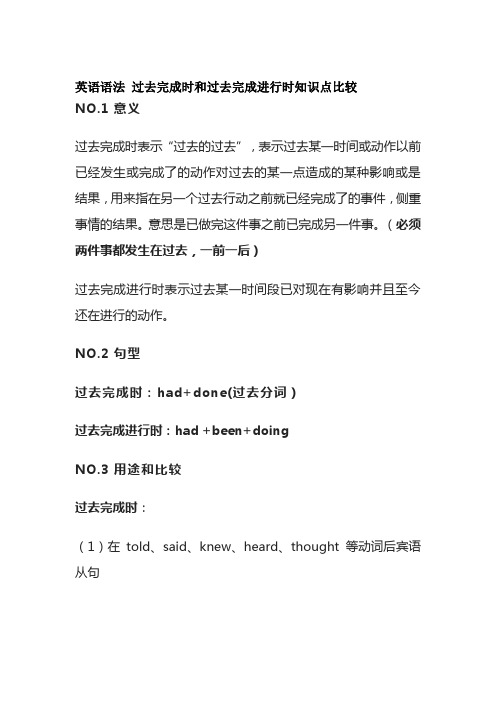
英语语法过去完成时和过去完成进行时知识点比较NO.1 意义过去完成时表示“过去的过去”,表示过去某一时间或动作以前已经发生或完成了的动作对过去的某一点造成的某种影响或是结果,用来指在另一个过去行动之前就已经完成了的事件,侧重事情的结果。
意思是已做完这件事之前已完成另一件事。
(必须两件事都发生在过去,一前一后)过去完成进行时表示过去某一时间段已对现在有影响并且至今还在进行的动作。
NO.2 句型过去完成时:had+done(过去分词)过去完成进行时:had +been+doingNO.3 用途和比较过去完成时:(1)在told、said、knew、heard、thought 等动词后宾语从句eg: She said that she had finished hishomework until her mum came back.她说她在她妈妈回来之前已经完成作业。
(2)作状语从句在过去不同时间段发生两个动作,发生在前,用过去完成时; 发生在后,用一般过去时。
eg: When I arrived, the train had left.当我到了,火车已经开了。
(3)表示意向,如“hope,wish,expect,think,intend,mean,suppose”等,用过去完成时表示“原本....,本能...."eg: We had hoped that you would come,but you didn't.我们希望你能来,但你没来(4)过去完成时的时间状语before,by, until,when, after, once, as soon aseg: He said that he had learned art before.他说他以前会学好艺术。
过去完成进行时:(1)表示到现在还尚未完成eg: He had been writing the novel.他还在写小说(2)企图eg: He had been studying English他仍在学习英语(3)未得结果eg: We had been studying what the teacher said.我们仍在学习老师教的知识(表示还没懂)(4)反复动作eg:He had been asking me the same question (很多次)他问过我很多相似的问题(5)情绪what had he been doing?(不耐烦)他在做什么?NO.4 理解过去完成时:句子中普遍存在过去式,两件事情都发生在过去,一前一后,强调结果过去完成进行时:时态少用,但经常强调事情对现在的影响。
英语中过去完成时和过去完成进行时的区别

英语中过去完成时和过去完成进行时的区别I (or You,He,John,They,Those men) had been studying.过去完成进行时与过去完成时的用法很相近,它通常表示一个持续到过去某时的动作:He had been waiting for two weeks. He was still waiting.(有一个表示一段时间的状语)Up to that time he had been translating those books.(He was still translating at “that time”.)He had been writing the letter till two o'clock.He was now thirty years old.He had been gambling since he was ten.(He was still gambling at thirty.)He had been standing there in the sun.(没有时间状语)He had been thinking about his marriage.不过这个时态并不一定表示这个过去动作将持续下去:He came back at seven.He had been waiting for her two hours.(At seven he did not wait any more.)He stopped swimming.He had been swimming for the last three hours.另一方面,这个时态也和现在完成进行时一样,也可有一些特别的含义:1)尚未完成:He had been writing the novel.(He had not finished it yet.)2)企图:He had been studying the meaning of this proverb.(He was trying to study it.)3)未得结果:We had been studying what our enemy had said.(But we were not able to understand it.)4)最近情况:He had been quarrelling with his wife.(lately)5)反复动作:He had been asking me the same question.(Many times) 6)情绪:What had he been doing?(不耐烦)这个时态很少用在否定句中,而多以过去完成时代替:He had not practised English for many years.(普通说法) He had not been practising English for many years.(少见)这个时态还可用在said,supposed等引起的间接引语中,代替现在完成进行时:He said,“I have been speaking to John.”= He said that he had been speaking to John.He thought,“She was watching me when I passed.”= He thought that she had been watching him when he had passed.。
一般过去时,过去进行时和过去完成时.

一般过去时,过去进行时和过去完成时.一般过去时、过去进行时和过去完成时语法专题突破品味语法1.I got up early,washed my face,had a quick breakfast and hurried to school. 2.He was watching TV at home from 3∶00 to 5∶00 yesterday afternoon.3.He had just finished sweeping the classroom when the teacher returned from the office自我探究这三句都使用了过去的时态。
第1句是一般过去时,表示“发生在过去的”动作;第2句是过去进行时,表示“在过去某一时刻或某段时间正在发生的动作”;第3句是过去完成时,表示在“过去某一时间之前已经完成的动作”。
讲解归纳一、一般过去时 1.表示在确定的过去时间内发生的动作或状态。
Did you watch the football match broadcast on TV yesterday evening?你昨晚观看电视转播的足球赛了吗?2.表示过去经常发生的动作或习惯性动作。
I always got up too late,and never had enough time for breakfast.我总是起床很晚,从来没有足够的时间吃早饭。
【温馨提示】这种情况也可用used to 和would 表示。
3.描述几个相继发生的过去动作。
The students got up early in the morning,did morning exercises and then read English aloud in the open air.学生们起床很早,做早操,然后在室外朗读英语。
4.有时动词的一般过去时形式上为过去,而实际上却指现在,即“原来想的”与现在的实际情况不相符。
hadbeendoing是什么时态怎么翻译
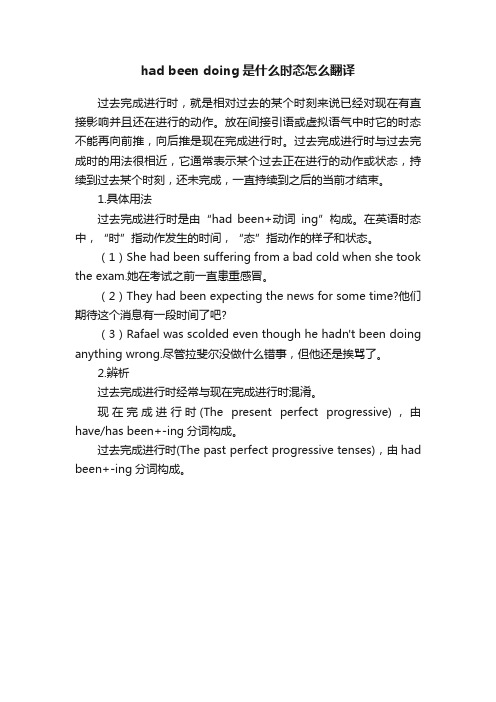
had been doing是什么时态怎么翻译
过去完成进行时,就是相对过去的某个时刻来说已经对现在有直接影响并且还在进行的动作。
放在间接引语或虚拟语气中时它的时态不能再向前推,向后推是现在完成进行时。
过去完成进行时与过去完成时的用法很相近,它通常表示某个过去正在进行的动作或状态,持续到过去某个时刻,还未完成,一直持续到之后的当前才结束。
1.具体用法
过去完成进行时是由“had been+动词ing”构成。
在英语时态中,“时”指动作发生的时间,“态”指动作的样子和状态。
(1)She had been suffering from a bad cold when she took the exam.她在考试之前一直患重感冒。
(2)They had been expecting the news for some time?他们期待这个消息有一段时间了吧?
(3)Rafael was scolded even though he hadn't been doing anything wrong.尽管拉斐尔没做什么错事,但他还是挨骂了。
2.辨析
过去完成进行时经常与现在完成进行时混淆。
现在完成进行时(The present perfect progressive),由have/has been+-ing分词构成。
过去完成进行时(The past perfect progressive tenses),由had been+-ing分词构成。
一般过去时,过去进行时和过去完成时
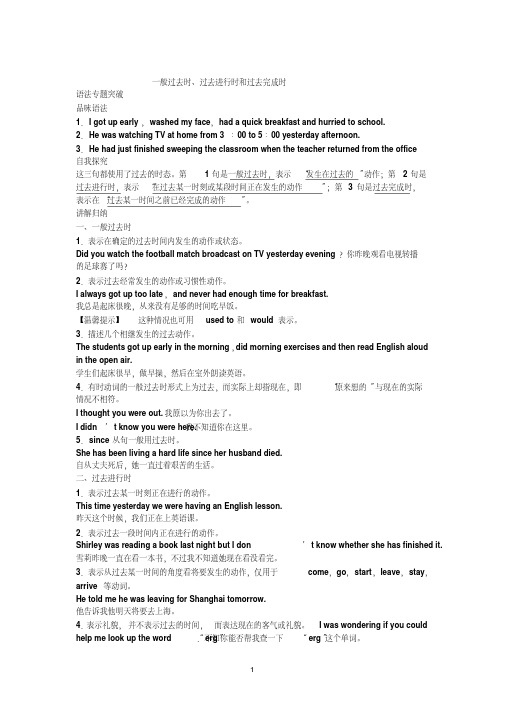
一般过去时、过去进行时和过去完成时语法专题突破品味语法1.I got up early,washed my face,had a quick breakfast and hurried to school.2.He was watching TV at home from 3∶00 to 5∶00 yesterday afternoon.3.He had just finished sweeping the classroom when the teacher returned from the office自我探究这三句都使用了过去的时态。
第1句是一般过去时,表示“发生在过去的”动作;第2句是过去进行时,表示“在过去某一时刻或某段时间正在发生的动作”;第3句是过去完成时,表示在“过去某一时间之前已经完成的动作”。
讲解归纳一、一般过去时1.表示在确定的过去时间内发生的动作或状态。
Did you watch the football match broadcast on TV yesterday evening?你昨晚观看电视转播的足球赛了吗?2.表示过去经常发生的动作或习惯性动作。
I always got up too late,and never had enough time for breakfast.我总是起床很晚,从来没有足够的时间吃早饭。
【温馨提示】这种情况也可用used to 和would 表示。
3.描述几个相继发生的过去动作。
The students got up early in the morning,did morning exercises and then read English aloudin the open air.学生们起床很早,做早操,然后在室外朗读英语。
4.有时动词的一般过去时形式上为过去,而实际上却指现在,即“原来想的”与现在的实际情况不相符。
I thought you were out.我原以为你出去了。
- 1、下载文档前请自行甄别文档内容的完整性,平台不提供额外的编辑、内容补充、找答案等附加服务。
- 2、"仅部分预览"的文档,不可在线预览部分如存在完整性等问题,可反馈申请退款(可完整预览的文档不适用该条件!)。
- 3、如文档侵犯您的权益,请联系客服反馈,我们会尽快为您处理(人工客服工作时间:9:00-18:30)。
过去完成进行式(Past Perfect Progressive Tense)
过去完成式的形式如下:
had + past participle
过去完成式是不能单独用的。
我们用的时候,必须有另一个事件。
也就是说,假如我
们有两件事 A 和 B,两件事都发生在过去,但 A 发生在 B 以前,A 应该用过去完成式,B 则用过去式。
以下是几个例子:
(1)他到台湾以前,曾学过中文。
He had studied Chinese before he came to Taiwan.
(2)他念大学以前,曾前工作过。
He had worked before he decided to go to college.
(3)我写这篇有关爱尔兰的小说以前,曾去过爱尔兰。
I had been to Ireland before I wrote this book about Ireland's people.
(4)我在上大学以前,已经学过微积分。
I had studied calculus before I got into college.
(5)周一以前,已经下过雪了。
It had already snowed before Monday.
如果我们要强调较早发生事件的连续性,我们可以用过去完成进行式。
占去完成进行
式和现在进行式惟一不同的地方是 verb to have 的地方一定要用had 。
以下是一些过去完成进行式的例子:
1. I had been watching TV before you called me.
2. I had been working hard in a company for many years before I went to college.
3. He had been studying before he went to class.
4. He had been driving all day before he went to sleep.
过去完成时
1)概念:表示过去的过去
----|-------|-----|---->其构成是had +过去分词构成。
那时以前那时现在
2)用法
a. 在told, said, knew, heard, thought等动词后的宾语从句。
She said (that) she had never been to Paris.
b. 状语从句
在过去不同时间发生的两个动作中,发生在先,用过去完成时;发生在后,用一般过
去时。
When the police arrived, the thieves had run away.
c. 表示意向的动词,如hope, wish, expect, think, intend, mean, suppose等,用过去完成时表示"原本…,未能…"
We had hoped that you would come, but you didn't.
3) 过去完成时的时间状语before, by, until , when, after, once, as soon as。
He said that he had learned some English before.
By the time he was twelve, Edison had began to make a living by himself.
Tom was disappointed that most of the guests had left when he arrived at the party.
过去完成进行时
形式:
I (or You,He,John,They,Those men) had been studying.
770 过去完成进行时与过去完成时的用法很相近,它通常表示一个持续到过去某时的动作:
He had been waiting for two weeks. He was still waiting.(有一个表示一段时间的状语)
Up to that time he had been translating those books.(He was still translating at “that time”.)
He had been writing the letter till two o'clock.
He was now thirty years old.He had been gambling since he was ten.(He was still gambling at thirty.)
He had been standing there in the sun.(没有时间状语)
He had been thinking about his marriage.
不过这个时态并不一定表示这个过去动作将持续下去:
He came back at seven.He had been waiting for her two hours.(At seven he did not wait any more.)
He stopped swimming.He had been swimming for the last three hours.
另一方面,这个时态也和现在完成进行时一样,也可有一些特别的含义:
1)尚未完成:
He had been writing the novel.(He had not finished it yet.)
2)企图:
He had been studying the meaning of this proverb.(He was trying to study it.)3)未得结果:
We had been studying what our enemy had said.(But we were not able to understand it.)
4)最近情况:
He had been quarrelling with his wife.(lately)
5)反复动作:
He had been asking me the same question.(Many times)
6)情绪:
What had he been doing?(不耐烦)
这个时态很少用在否定句中,而多以过去完成时代替:
He had not practised English for many years.(普通说法)
He had not been practising English for many years.(少见)
这个时态还可用在said,supposed等引起的间接引语中,代替现在完成进行时:
He said,“I have been speaking to John.”= He said that he had been speaking to John.
He thought,“She was watching me when I passed.”= He thought that she had been watching him when he had passed.
更多英语学习方法:
上海企业英语培训/zt/city_shanghai.html。
